FAQs
How Do We Produce Organic Blue Mussels In Our Pristine Newfoundland Environment?
Click on the images below to see how, and use the "next" tab at the upper right of each image to advance.
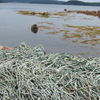
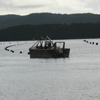
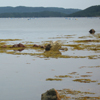
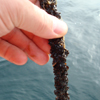
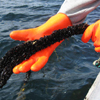
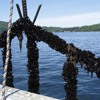
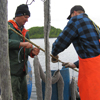
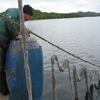
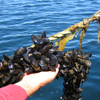
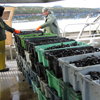
. . . . . . . . . . . . . . . . . . . . . . . . . . . . . . . . . . . . . . . . . . . . . . . . . . . . . . . .
What Is Organic Mussel Farming?
- Aquaculture operations that are sustainable and in harmony with the environment.
- A holistic system of farming that optimizes productivity but maintains diverse, healthy communities in the aquatic ecosystem. This includes benthic organisms, aquatic plants, other marine animals, and people who live and work within the community.
- Organic standards that limit the use of substances such as fertilizers, pesticides, drugs, chemicals and other additives, so that the aquaculture process is as close to natural as possible.
- Protection of the environment to minimize benthic or water quality degradation or pollution.
- Recycles materials (e.g. ropes, biodegradable socking) and resources (e.g. natural plankton food cycle and nutrients) to minimize impacts and for long-term sustainability.
. . . . . . . . . . . . . . . . . . . . . . . . . . . . . . . . . . . . . . . . . . . . . . . . . . . . . . . .
How Do Our Organic Mussels Differ From Non-Organic Mussels?
|
Organic |
Non-Organic |
Traceability |
☆☆☆☆☆ |
✗ |
Consumer Confidence |
☆☆☆☆☆ |
☆☆☆ |
Food Safety |
☆☆☆☆☆ |
☆☆☆ |
Environmental Monitoring |
☆☆☆☆☆ |
☆☆☆ |
Sustainability |
☆☆☆☆☆ |
☆☆☆ |
Healthy |
☆☆☆☆☆ |
☆☆☆ |
Natural |
☆☆☆☆☆ |
☆☆☆ |
Third Party Certification |
☆☆☆☆☆ |
✗ |
. . . . . . . . . . . . . . . . . . . . . . . . . . . . . . . . . . . . . . . . . . . . . . . . . . . . . . . .
Why are Organic Mussels a Reflection of a Healthy Environment?
- Mussels are suspension or filter feeders. They are often an environmental indicator species for monitoring the health of our waters (e.g. heavy metals, toxins). Our organic certification includes stringent monitoring of our waters and mussel health. NL mussels are of excellent quality.
- Starfish, lobsters and other marine life rely on mussels as part of their natural food web. Our organic farming practices strive to minimize impacts on other local species. Some species actually flourish near our farms such as lobsters and fish stocks.
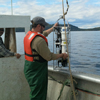
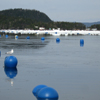
. . . . . . . . . . . . . . . . . . . . . . . . . . . . . . . . . . . . . . . . . . . . . . . . . . . . . . . .
How Do Organic Mussel Farms Contribute to Our Communities?
- The mussel industry contributes to the local community and economy through jobs, infrastructures and the service sectors. See career resources on the NAIA website (Newfoundland Aquaculture Industry Association)
- The mussel industry is based on sustainable farming practices that minimize impacts. It works with schools, education institutes and other community groups to foster awareness. The NAIA website includes online school resources and public awareness information
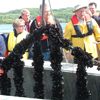
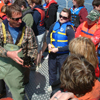
. . . . . . . . . . . . . . . . . . . . . . . . . . . . . . . . . . . . . . . . . . . . . . . . . . . . . . . .
Interesting Facts About Mussels
- A quick way to check that a mussel is alive and fresh when you are cooking them is to tap the shell. It should close tightly. Discard open, unresponsive mussels. See the NAIA website for instructions on cooking mussels and recipes, or go to the Ocean Fresh Mussels Ltd. website.
- If you are a scuba diver and want to attract fish like cunners, crack open mussels in your hand. The fish will come to feed! Cunners, a perch-like fish, are common in our coastal waters. Research is being done to use them as a cleaner fish for external parasites on finfish as they naturally eat these in the wild.
- The mussel's "beard" is its byssal threads which produce a liquid that acts like adhesive cement that sets in contact with water. This is how they attach to our ropes for cultured mussels. Scientists are also working to use this adhesive property of mussels for surgery.


